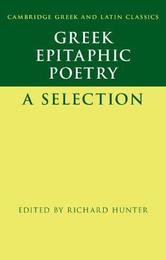
|
Greek Epitaphic Poetry: A Selection
Hardback
Main Details
Description
Thousands of Greek verse epitaphs, covering a millennium of history, survive inscribed or painted on stone. These largely anonymous poems shed rich light on areas such as ancient moral values, religious ideas, gender relations and attitudes, as well as on the transmission and reception of 'canonical' poetry; many of these poems are of very high literary quality. This is the first modern commentary on a selection of these poems. Problems of syntax, metre and language are fully explained, accompanied by sophisticated literary discussion of the poems. There is a full introduction to the nature of these poems and to their context within Greek ideas of death and the afterlife. This comprehensive edition will be of interest to advanced undergraduates and graduate students studying Greek literature, as well as to scholars.
Author Biography
RICHARD HUNTER is Regius Professor of Greek Emeritus in the University of Cambridge and a Fellow of Trinity College. He has published extensively in the fields of Greek and Latin literature; his most recent books include Plato and the Traditions of Ancient Literature: The Silent Stream (Cambridge, 2012), Hesiodic Voices (Cambridge, 2014), Apollonius of Rhodes: Argonautica Book IV (Cambridge, 2015), The Measure of Homer (Cambridge, 2018), and (with Rebecca Laemmle) Euripides: Cyclops (Cambridge, 2020). Many of his essays have been collected in the two-volume On Coming After: Studies in Post-Classical Greek Literature and its Reception (2008). He has edited the Journal of Hellenic Studies and is on the editorial board of Cambridge Greek and Latin Classics, Cambridge Classical Studies and several European journals. He is a Fellow of the British Academy, holds honorary degrees from the Aristotle University of Thessaloniki and the University of Ioannina, is a Foreign Fellow of the Academy of Athens and an Honorary Fellow of the Australian Academy of the Humanities.
Reviews'... it represents extremely good value, and is strongly recommended.' Colin Leach, Classics for All
|